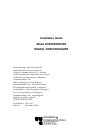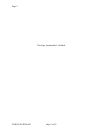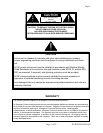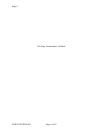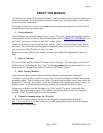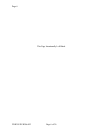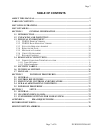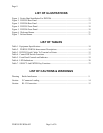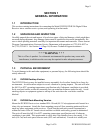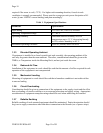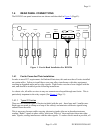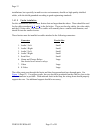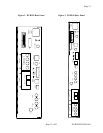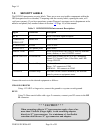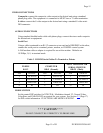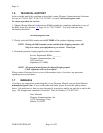
Page 9
Page 9 of 30 DVR395/DVR396-002
SECTION 1
GENERAL INFORMATION
1.1 INTRODUCTION
This section contains instructions for connecting the Model DVR395/DVR396 Digital Video
Receiver into a satellite receive system, and operating it in that mode.
1.2 UNPACKING AND INSPECTION
Carefully unpack the unit and inspect it for obvious signs of physical damage, which might have
occurred during shipment. Any damage claims must be reported to the carrier immediately. Be
sure to check packing materials carefully for important documents and materials. Please contact
Wegener Communications Customer Service Department with questions at (770) 814-4057 or
fax (770) 232-0621. See Section 1.6 (Page 16) for more Technical Support assistance.
1.3 PHYSICAL ENVIRONMENT
To avoid damage to this and other equipment, or personal injury, the following items should be
strictly observed.
1.3.1 DVR395 Desktop Version
The DVR395 Receiver may be installed on any reasonably level surface located in a clean, dry
environment. Avoid locations subject to severe vibration or jarring impacts. The unit will meet
the full 10 to 40
o
C operating temperature specification only if adequate ventilation is provided.
Set it on a hard surface so that the mounting feet can maintain clearance under the unit. Avoid
stacking objects or equipment against or on top of the unit where the vent holes would be
blocked.
1.3.2 DVR395 Rack-Mounting Version
Mount the DVR395 Receiver in a standard EIA 19-inch (48.3 Cm) equipment rack located in a
clean, dry environment. Attach the front mounting ears at all four mounting points and do not
stack any other equipment on the receiver. Check that the total rack current consumption is
within the limits of the AC branch circuit and that a reliable earth safety ground is maintained.
The unit will meet the full 10 to 40
o
C operating temperature specification only if adequate
ventilation is provided. This requirement is easily met if the installer leaves one empty 1-3/4-
inch (4.4 Cm) rack-unit space between units (50% rack utilization). Forced air is usually not
* * * WARNING * * *
This is a Class A product. In a domestic environment this product may cause radio
interference, in which case the user may be required to take adequate measures.



